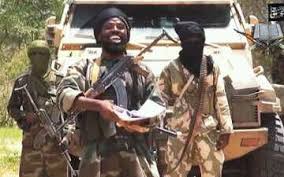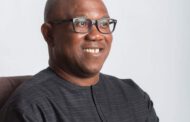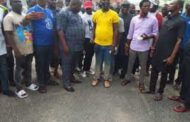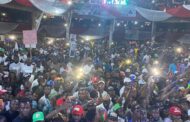The most impressive building in Otuoke, Nigerian President Goodluck Jonathan’s home town in the oil producing Niger Delta, is the multistory mansion complex he has built for himself and close family while in office.
A few hundred metres away, the street where he grew up is a jumble of rusting iron-roofed shacks. Down a dirt side alley, Happiness Ebi smokes fish on a charcoal barbecue, a staple in this swampy southern region.
“We haven’t really seen much benefit since our brother became president, except the university,” she says, referring to the shiny Federal University Otuoke, completed in 2011, that has about 1,000 students and nearly a third more staff.
“But there’s no light, no water here. We’re disappointed.”
Yet she will vote for him again in a presidential election set for March 28. “Of course,” she says, “He’s our brother.”
Her answer reveals why the delta, historically one of Nigeria’s most marginalised regions although its oil provides three quarters of government revenue, could erupt again if Jonathan leaves office.
Otuoke, on the banks of a sand-coloured river, does not feel particularly favoured, although the few cars, well-clothed inhabitants and thriving petty trade show it is doing better than many places.
But having one of its own in the top job for the first time has helped pacify a region long incensed by a feeling of being left out of political power despite its oil riches.
“We have been oppressed, we have been sidelined, and we are the people feeding this country,” militant leader ‘Ex-General Pastor’ Reuben Wilson told Reuters over a whiskey and Coke at his office in Yenagoa, capital of Jonathan’s Bayelsa state.
Militants like Wilson fought for a greater share of the oil riches and fairer representation until an amnesty deal in 2009.
The deal provides militant leaders with multimillion dollar monthly payouts they are meant to share with their men. They also get lucrative government contracts. The amnesty was due to expire last year but payments were extended for fear of a backlash. Under Buhari both payments and contracts could end.
“With Goodluck as President we achieved what we are fighting for. It’s our right. If they refuse us our right, by rigging the election, I don’t think there will be peace,” Wilson said, holding an ‘appreciation award’ from Miss Niger Delta 2010.
“HE WHO PAYS THE PIPER”
It is not only militants who feel it is the delta’s right to field a president for another elected term despite an informal deal that power should rotate between north and south every two terms.
There is a broadly felt sense of entitlement to the oil riches that have fattened up corrupt governments but brought little to the region except environmentally catastrophic oil spills.
Nigeria’s tensions are often seen as between a largely Muslim north and mostly Christian south. This contest between opposition leader Muhammadu Buhari, a Muslim northerner, and Jonathan, a southern Christian, does appear to fit that picture.
But in a nation the British carved a century ago out of peoples speaking 500 languages, rivalries are more complicated.
From the Niger Delta perspective, since independence in 1960, Nigeria has been ruled by two Christian Igbo easterners, a Middle Belt minority military ruler, two northern Fulani generals, two southwestern Yoruba rulers, a Hausa northern general, a Kanuri northeastern general and a Fulani civilian.
The only part of Nigeria that has completely missed out on this merry-go-round is the Niger Delta — until Jonathan.
“Someone from the Niger Delta got to be president by accident, and despite it generating all the money, it is, or at least was, about as poor as you will find in any part of the country,” said Antony Goldman, head of PM consulting.
Jonathan’s critics say the delta benefits disproportionately from his presidency, but evidence does not stand up the claim.
The highway Yenagoa connecting to the oil hub of Port Harcourt is now so smooth traffic whizzes along it dangerously fast, but roads in other parts of Nigeria have also been fixed.
Jonathan’s flagship reform policies — power and farming — have not hugely benefited the delta. Power privatisation has yet to translate to more kilowatts on the grid anywhere, while reforms to farming, especially cutting corrupt middle men out of a state fertiliser scheme, has disproportionately benefited the north, where the vast majority of agriculture happens.
Even so, the mere fact the president is from the delta is enough for many to feel historic injustices are being righted.
The north’s parallel discontent at losing political power is in focus because of the Boko Haram Islamist insurgency that has killed thousands and destabilised Africa’s top oil producer.
But if Jonathan loses an election that his delta supporters feel was not fair, or if he is pushed out by a faction within his party that opposes him — Nigeria could well have two insurgencies on its hands.
“The bigger tribes … feel they have the divine right to rule others,” said Mujahid Dokubo-Asari, head of the Niger Delta People’s Volunteer Force which pushed oil prices to record highs in 2004 with attacks and threats on the oil industry.
“Then one man from a tiny community in Ijaw comes. He’s not Yoruba, Igbo, or Hausa. They can’t bear it,” he told Reuters in the opulent Bayelsa state government guest house.
“He who pays the piper must dictate the tune, and the delta has been paying the piper for so very long. If they make war, we can make war. We have the capacity to take what’s ours.”
The extent to which this is bluster will be crucial in determining how easy it will be to pacify the delta, and some analysts assume that a Buhari government would be able to buy off the ex-militants, some of whom, like Asari and Tom Polo, have become multimillionaires off government contracts.
About a month ago, the governor of Bayelsa state, Seriake Dickson, met with the militants in an effort to calm them down.
“I made it clear that the way forward is peace, and I wanted a commitment from them to keep it,” he told Reuters over a lunch of peppered snails, yams and beancakes in the capital Abuja.
“I know what their fears are, but they agreed to work with me to keep the peace. And I believe they will.”
View Comments (71)














